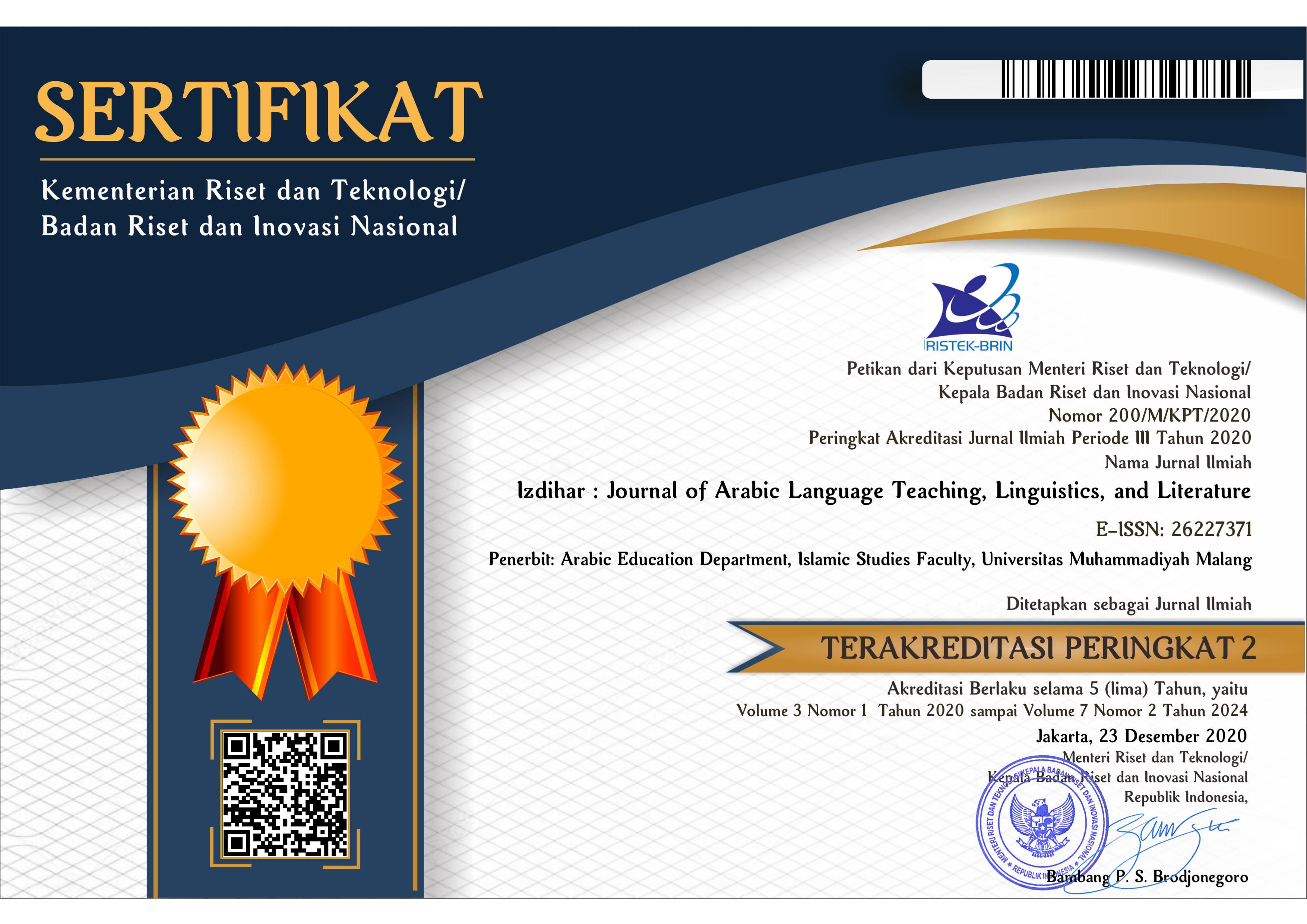Perspectives on the Arabic Language from University Student: Between Reality and Hope
DOI:
https://doi.org/10.22219/jiz.v3i1.11757Keywords:
Cirebon, Ideal Conditions, Learning Objectives, PerspectiveAbstract
Learning Arabic language has the ideal conditions that students want to achieve. therefore, the ideal condition is highly dependent on various factors. This research discusses the views or perspectives on the Arabic Language from students of IAIN Syekh Nurjati Cirebon that are enrolled in different faculties. This research contains several objectives: primarily to learn the direct thoughts of students on the Arabic language and its relevance within both national and international level. In addition, this study reveals the academic conditions of the students that has a direct correlation towards their preparedness and desire to receive studying materials in one semester whilst studying during first semester 2019 in from the total amount of sample that consists of 109 students. The researcher utilizes the survey method to perform the study along with empty cards as an aiding tool which was distributed among students. The empty papers that were provided were given to let students write their brief reasonings behind their perspective on Arabic Language. The outcome of this study shows that there were 40% of students having negative views towards the Arabic language, 45% of students with positive views while 10% of the research sample combines themes or contents closely related to the Arabic language. Furthermore, 5% of student gave suggestions and ideas for learning Arabic language. This research has contributed in several ways especially in understanding the student’s perspectives and opinions on Arabic language and help the lecturers to identify suitable teaching methods to use during the learning and teaching process.
Downloads
References
Al-A`araj, R. R., & Muqabalah, N. M. (2019). Designing an Educational Unit Based on McGraw-Hill Program and Measuring its Effect on Female Sixth Grade Students’ Reading Comprehension in Jordan. International Center for Research & Studies, 27(6), 365–386. DOI: https://doi.org/ISSN 2410-3152
Alsweerky, M. A. H. (2020). Analysis of the content of Arabic language courses for the secondary stage ; Scientific and administrative track in the Kingdom of Saudi Arabia in light of the theory of multiple intelligences. Journal of Educational and Psychological Sciences, 4(3), 21–39. DOI: https://doi.org/ISSN: 2522-3399
Al-Syua`ibi, M. al-S. Q., & Al-Syahrani, S. bin A. (2014). Assessing Quality of Educational Services from Students` Perspectives at King Khalid University. Thamar University Journal for Studies and Researches : Refereed Scientific Journal Focuses on Human Knowledge and Applied Sciences, 19(1), 316–346.
Aqal, M. S., Sholeh, N. F., & Shiyam, S. A. (2020). The Effectiveness of STEAM in Developing The Arabic Language Skills of The Secondgrade Students. IUG Journal of Educational and Psychology Sciences, 28(1), 25–47. https://journals.iugaza.edu.ps/index.php/IUGJEPS/article/view/7470/2939
As-Syuwairikh, S. N. (2016). Qadhaya Asasiyah Fi Ta`lim Al-Lughah Al-Atssaniyah (1st ed.). Wojooh Publishing & Distribution House. https://kaica.org.sa/links/epubs/ep004.pdf
Barkat, M. (2017). Limaza Yata`llamu Al-Ba`dh Al-Lughat Al-Ajnabiyah Bishuhulah ? https://www.alaraby.co.uk/jeel/journalism/2017/2/24/لماذا-يتعلم-البعض-اللغات-الأجنبية-بسهولة
Chik, A. R. Bin. (2015). Al-Al`aab Al-Lughawiyah Fii Ta`limil Al-Lughah Al-Arabiyah Fii Al-Madaris Al-Ibtidaiyah Fii Barnamaaj (J-QAF) Fii Malaysia: Dirasah Tahliliyah. Arabiyât : Jurnal Pendidikan Bahasa Arab Dan Kebahasaaraban, 2(2), 278–298. DOI: https://doi.org/10.15408/a.v2i2.2089
Setyawan, E. (2016). Profil Unit Pelaksana Teknis (UPT) Pusat Pengembangan Bahasa (PPB) IAIN Syekh Nurjati Cirebon. IAIN SEJATI PRESS. http://web.Sheikhnurjati.ac.id/ppb/profil-upt-ppb/
Fahrurrozi, A. (2014). Pembelajaran Bahasa Arab : Problematika dan Solusinya. ARABIYAT: Jurnal Pendidikan Bahasa Arab Dan Kebahasaaraban, 1(2), 161-180. DOI: https://doi.org/10.15408/a.v1i2.1137
Fauzi, M. F., Buhun, M. F., & Purwadi, A. (2019). The Influence of Teams Games Tournament (TGT) toward Students’ Interest in Arabic Language Learning. Izdihar: Journal of Arabic Language Teaching, Linguistics, and Literature, 2(2), 135–148. DOI: https://doi.org/10.22219/jiz.v2i2.9986
Furqon, M. R., & Fauzi, M. F. (2019). The Values of Educational Character in the Arabic Temples of Qasidah Burdah by Imam Bushiri. Izdihar: Journal of Arabic Language Teaching, Linguistics, and Literature, 2(1), 67–76. DOI: https://doi.org/10.22219/jiz.v2i1.8327
Ganeem, I. (2018). Hillul Musykilat: Istiratijiyatu Tadris Fa`alah Litathwiri Maharat Al-Luqhah Ladal Muta`lallimin. El-Thumuhat, 1(2), 1–14. DOI: https://doi.org/10.25299/elthumuhat.2018.vol1(2).2173
Gazali, E. (2019). Menakar Tantangan dan Potensi Jurusan Bahasa dan Sastra Arab (BSA) IAIN Syekh Nurjati Cirebon di Era Pendidikan 4 . 0. Arabiyatuna: Jurnal Bahasa Arab, 3(2), 229–250. DOI: https://doi.org/10.29240/jba.v3i2.857
Hasanudin, C., & Fitrianingsih, A. (2020). Verbal Linguistic Intelligence of the First-Year Students of Indonesian Education Program: A Case in Reading Subject. European Journal of Educational Research, 9(1), 117–128. DOI: https://doi.org/10.12973/eu-jer.9.1.117
Islam, A. M. S. (2015). Faktor Demotivasi Pembelajaran Bahasa Arab dalam Perspektif Siswa Madrasah. Arabiyât: Jurnal Pendidikan Bahasa Arab dan Kebahasaaraban, 2(1), 1–16. DOI: https://doi.org/10.15408/a.v2i1.1511
Istiqomah, H., & Mahliatussikah, H. (2019). Musykilat al-Tarbiyyah Tuwajihuha al-Thalabah fi Ta’allum al-Lughah al-Arabiyah li Ghairi al-Nathiqin Biha. Jurnal Al Bayan: Jurnal Jurusan Pendidikan Bahasa Arab, 11(2), 254–280. DOI: https://doi.org/10.24042/albayan.v%vi%i.5257
Kama, N. (2014). Language Learning Strategies and Teaching Arabic Styles for Non Arabic Speakers. September. https://doi.org/10.13140/2.1.2766.2725
Khasanah, N. (2018). Desain Pengembangan Kurikulum Pembelajaran Bahasa Arab Berbasis Pendekatan Potensi/Fitrah. Al-Mahara: Jurnal Pendidikan Bahasa Arab, 4(2), 159–180. DOI: https://doi.org/10.14421/almahara.2018.042-01
Mei, S. Y., Ju, S. Y., & Mohd, A. B. (2017). Cooperative Learning Strategy in Teaching Arabic for Non Native Speakers. European Journal of Social Sciences Education and Research, 11(2), 262-267. DOI: https://doi.org/10.26417/ejser.v11i2.p261-266
Meredeen, S. (1993). Study For Servival and Succes For College Students (Mansyurat). London: Champan Publishing Ltd.
Mukmin, M. (2019). The Effect of Educational Background and Language Competence on Students’ Arabic Language Motivation. Arabiyat: Jurnal Pendidikan Bahasa Arab dan Kebahasaaraban, 6(1), 36–52. DOI: https://doi.org/10.15408/a.v6i1.10484
Murdiono. (2018). Dirasah Halah an Muyuli Thalabah fi Ta`allum al-Lughah al-Arabiyah bil Madaris al-Mutawassithah al-Islamiyah bi Malang wa Batu. Izdihar: Journal of Arabic Language Teaching, Linguistic, and Literature, 1(2), 153–166. DOI: https://doi.org/10.22219/izdihar.v1i2.7297
Musa, I. H. A., & Aqal, M. S. (2019). The Effectiveness of Electronic Educational Environment Using Active Learning Strategies in Developing Future Thinking Skills in Technology among Female Seventh Graders. IUG Journal of Educational and Psychology Sciences, 27(6), 01–34. DOI: https://doi.org/ISSN 2410-3152
Ngui, G. K., & Lay, Y. F. (2020). The Effect of Emotional Intelligence, Self-Efficacy, Subjective Well-Being and Resilience on Student Teachers’ Perceived Practicum Stress: A Malaysian Case Study. European Journal of Educational Research, 9(1), 277–291. DOI: https://doi.org/10.12973/eu-jer.9.1.277
Nurcholis, A., & Hidayatullah, S. I. (2019). Tantangan Bahasa Arab sebagai Alat Komunikasi di Era Revolusi Industri 4.0 pada Pascasarjana IAIN Tulungagung. Arabiyatuna : Jurnal Bahasa Arab, 3(2), 283-298. DOI: https://doi.org/10.29240/jba.v3i2.999
Rumman, T. A. (2014). Isthitla` Ar-Ra`i Al-A`am Fil Amal Khairi. International Center for Research & Studies, 1(1), 154–183. https://www.medadcenter.com/MedadMag/1/fahres
Rusady, A. T. (2018). Dawafi’ al-Thullab fi Ta’allum al-Lughah al-’Arabiyyah wa Dawr al-Mu’allim fi Tarqiyatiha. Jurnal Izdihar: Journal of Arabic Language Teaching, Linguistics, and Literature, 1(1), 65–78. DOI: https://doi.org/https://doi.org/10.22219/izdihar.v1i1.6563
Sumiarni, N. (2014). Pembelajaran Bahasa Arab Bagi Mahasiswa Pemula Di Pusat Bahasa dan Budaya (PBB) IAIN Syekh Nurjati Cirebon (Problematika dan Solusinya). Holistik : Journal for Islamic Social Sciences, 16(1), 19–38. DOI: https://doi.org/10.24235/holistik.v15i1.432
Sumiarni, N. (2016). Pembelajaran Bahasa Arab bagi Mahasiswa Pemula di Pusat Bahasa dan Budaya (PBB) IAIN Syekh Nurjati Cirebon (Problematika dan Solusinya). Holistik, 15(1),19-38. DOI: https://doi.org/10.24235/holistik.v15i1.432
Sumiarni, N., & Syafrawi, A. S. (2019). Efektifitas Pembelajaran Menyimak Dan Berbicara Untuk Pemula (Maharat Al-Istima’ Wa Al-Kalam Lil Mustawa Al-Tamhidi) Berbasis KKNI Pada Mahasiswa Jurusan Pendidikan Bahasa Arab (PBA) IAIN Syekh Nurjati Cirebon. EL-IBTIKAR: Jurnal Pendidikan Bahasa Arab, 8(1), 78–92. DOI: https://doi.org/10.24235/ibtikar.v8i1.3910
Thu’aimah, R. A. (2010). Al-Marji’ fi Manâhij Ta’lîm al-Lughah al-‘Arabiyyah li an-Nâthiqîn bi Lughât Ukhrâ. Cairo: Daar al-Fikr al-‘Arabî.
Tosun, S. (2013). A Comparative Study on Evaluation of Turkish and English Foreign Language Textbooks. Procedia - Social and Behavioral Sciences, 70, 1374–1380. DOI: https://doi.org/10.1016/j.sbspro.2013.01.199
Ummi, H. U., & Mulyaningsih, I. (2016). Penerapan Teori Konstruktivistik Pada Pembelajaran Bahasa Arab Di IAIN Syekh Nurjati Cirebon. Journal Indonesian Language Education and Literature, 1(2), 53–65. DOI: https://doi.org/10.24235/ileal.v1i2.600
Wahab, M. A. (2016). Standarisasi kurikulum pendidikan bahasa Arab di perguruan tinggi keagamaan Islam negeri. Arabiyat: jurnal pendidikan bahasa Arab dan kebahasaaraban, 3(1), 32–51. DOI: https://doi.org/10.15408/a.v3i1.3187
Wijaya, I. S., & Pimada, L. H. (2019). Ta`lim al-Imla` bi Al-Wasit al-Muta`addidah li Tarqiyah Maharah al-Kitabah fi al-Lughah al-`Arabiyyah. Jurnal Al Bayan: Jurnal Jurusan Pendidikan Bahasa Arab, 11(2), 320–339. DOI: https://doi.org/10.24042/albayan.v11i2.5266
Downloads
Published
How to Cite
Issue
Section
License
Copyright Notice
Authors who publish with this journal agree to the following terms:
- Authors retain copyright and grant the journal right of first publication with the work simultaneously licensed under a Creative Commons Attribution-ShareAlike 4.0 International License that allows others to share the work with an acknowledgment of the work's authorship and initial publication in this journal.
- Authors are able to enter into separate, additional contractual arrangements for the non-exclusive distribution of the journal's published version of the work (e.g., post it to an institutional repository or publish it in a book), with an acknowledgment of its initial publication in this journal.
- Authors are permitted and encouraged to post their work online (e.g., in institutional repositories or on their website) prior to and during the submission process, as it can lead to productive exchanges, as well as earlier and greater citation of published work (See The Effect of Open Access).
Copyright (c) 2019 Izdihar : Journal of Arabic Language Teaching, Linguistics, and Literature

This work is licensed under a Creative Commons Attribution-ShareAlike 4.0 International License.

















